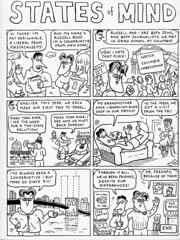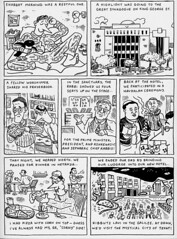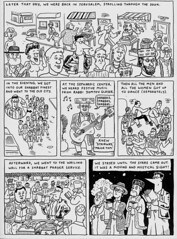That's Arabic for "enough," as I'm told in an
article expressing cautious optimism about prospects for democracy in the Middle East. This has become the name for a movement across the region for greater rights -- for women and for citizens in general. The writer, Youssef M. Ibrahim, lists numerous democratic gestures made recently: elections in Palestine and Iraq, promises to expand the franchise in Saudi Arabia, nonviolent protests in Lebanon. Yet he asks the pertinent question: Does this seem less like Berlin 1989 and more like Beijing 1989?
I'm hoping that the democracy movement (at least, if the media is presenting this accurately) can flourish in the Middle East. However, as Ibrahim also accurately points out, this movement has neither a Gorbachev nor any official recognition. Revolutions led by the masses have succeeded in places like the Philippines (against Ferdinand Marcos), where the term "People Power" gained popularity. The prospects sound encouraging, but there are plenty of risks. Would any of the rulers in the Middle East -- the House of Saud, Hosni Mubarak in Egypt, the Hashemite dynasty in Jordan (one of the more enlightened monarchies in the region) -- renounce their power and hand it to the people?
Furthermore, what would a people's government look like? Would it be secular -- a mini-West, with women's rights and open debate? Well, one thing that Sari Nusseibeh said on Tuesday was that there has been an increase in the Islamicization of the Middle Eastern public. Would democracies, therefore, become theocracies? Or would they lapse into regions of anarchy, like Afghanistan or the Sudan?
Last year, King Abdullah II of Jordan suggested that what Iraq needs is a strong leader as opposed to a democracy. Dictators, to play devil's advocate, can be useful; Marshal Tito united a fractious Yugoslavia that fell apart once the Cold War ended. Still, denying a people full representation in a government breeds resentment and violates a basic human right.
Other items that interested me:
1. An intriguing
article in the LA Times by a Georgetown linguistics professor, Deborah Tannen, about the recent debate over women's representation in editorial pages. Tannen writes that what makes opinion writing in general a difficult profession for many to succeed in is the attack-dog style people feel is necessary for such a position. She continues by suggesting that this style is nurtured by our society -- the idea that American boys develop a love for roughhousing, while American girls are taught reserve.
This article resonated with me. Growing up, I played with such toys as GI Joe, Masters of the Universe, GoBots and Transformers. My action figures included both heroic and villanous types, and each sets had their own weapons. The popular toys for girls, meanwhile, included Cabbage Patch Kids and Barbie dolls.
I remember, while participating in a drama workshop at Tufts University, helping to perform a version of the song "William's Doll," which concerns a boy named William who shuns sports and, instead, wants to play with a doll. I still recall some of the lyrics: "'A doll,' said William, 'Is what I need/To wash and clean,/And dress and feed...'" (Okay, Google helped with the lyrics.) His father and male relatives laugh at him initially, but in the end, they find out that he wants a doll so he can learn to take care of the children he will eventually have. I found this a beautiful song.
(Granted, I also don't like the metrosexuals who have become profuse in American cities. Their mistake is confusing sensuousness for sensitivity.)
I'm not saying that little boys should toss their action figures and toy guns and join their sisters in playing house. (Though that's not a bad idea!) What purpose does fighting serve? Teaching kids to become bullies? Teaching them that whoever expresses an argument louder or more forcefully than his peers is right? The author of the article cites numerous cultures -- the Chinese, for example -- that teach young people of both genders the virtues of refined debate.
In a high school French class, we once had to read a La Fontaine fable about "le loup et l'agneau" (the wolf and the lamb), in which the wolf approaches a helpless lamb and attempts to justify why the former must eat the latter. When none of these arguments is proved logical, the wolf finally explains that he is hungry and must have his dinner, whereupon he promptly tears into the lamb. Displeased with this ending, I wrote a substitute one featuring a new character, "un porc-epic" (a porcupine), who stings and scares away the wolf and rescues the lamb. My new moral (the old one, I believe, was "Might makes right") was that there needs to be the deterrent of law to prevent injustices being done to the weak.
I'm thinking that we in the United States need to become porcupines. People in the media and in life in general should conduct their affairs civilly, without scare tactics. Yet if our opponents will not take the high ground, we should know how to use their tactics as effectively as they can.
One last note, about a different issue:
Larry Summers, as I noted in my previous post, has lost a vote of confidence from his faculty. Four hundred and twenty-one professors out of a possible total of 802 showed up for the meeting. Eighteen abstained, 218 voted for the measure, and 185 voted against it. Those who backed the measure say they are not simply criticizing the Harvard president for his remarks on women and science; they are criticizing him for his abrasive leadership style.
On one hand, I feel this is the end of Summers at Harvard. He will resign, and the Harvard Corporation will pick another kindly fund-raiser like Neil Rudenstine. The faculty will exercise a more vocal presence at the university. Perhaps they will develop their own Star Chamber for students who, like their quondam president, express opinions contrary to their own.
Then again, maybe -- maybe -- Summers will regain his resolve, and the Croesuses (Croesi?) of the Corporation will hold firm, and the Prescott Street panjandrums will weather this storm. But the fact that he did lose a vote of no confidence to the faculty will remain a blot on Summers' career, just as his former boss, Bill Clinton, is tarnished for having been impeached.
Okay, one final -- and I mean final! -- point: The Wall Street Journal has published a
commentary by P.J. O'Rourke in which O'Rourke lampoons the public-transportation movement, which is encouraging Congress to pass a $52-plus billion measure in support of mass transit. O'Rourke says that four percent of Americans take public transportation to work (can someone find me the percentage who take it for leisure?), and that the enterprise in general is costly (say, $52 billion).
Comments from a frequent user of the T in Boston and fan of the MTA in New York: I don't drive. Someday, I hope to fix this. But in the meantime, the subway provides me with a relatively inexpensive way to get around the Greater Boston area. For the cost of $44 each month, I can purchase a subway pass that allows me to do this. Compare that to the hundreds of dollars I would spend on car payments, insurance, and gasoline.
Furthermore, as Eric Schlosser pointed out in "Fast Food Nation," one reason so few Americans take public transportation is because they can't. Straw corporations owned by car companies bought up city bus lines across the country and destroyed them, essentially forcing the public to choose to drive.
Among those who do take public transportation are the poor, elderly, and disabled. Denying this service to these groups is not a little heartless. I would also argue that the less people on the roads means less traffic. Those of us who take mass transit, at least theoretically, make life easier for those who don't. Ditto parking spaces; every person who rides the subway or takes the bus, in theory, provides a parking spot for someone else. And, of course, for those who like to go out for a few drinks at night, public transportation provides a safe (again, in theory) alternative to driving drunk.
Public transportation, therefore, is a far more valuable service than O'Rourke would imply.



